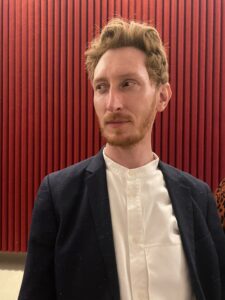Gavin Steingo is Professor in the Department of Music at Princeton University. He is also affiliated with the programs in Media and Modernity, African Studies, and Jazz Studies. Steingo’s research examines sound and music as fundamental features in the construction of global modernity, with research specializations in African music, sound studies, acoustic ecology, and music and philosophy. Methodologically, his work is united by a mode of inquiry where theory, history, and ethnography form part of a shared constellation.
Steingo recently completed his second book, Interspecies Communication: Sound and Music Beyond Humanity, a comprehensive study of human attempts to communicate with non-humans in the modern era. Can humans communicate with animals—and to what extent? What kinds of communication are possible? And with what tools, theories, and mechanisms? Interspecies Communication explores answers to these questions, revealing how interspecies endeavors get caught up in some of humanity’s thorniest and most precious practices and concepts: language, beauty, spirituality, love, loneliness, and meaning itself. The book also shows that music is often used to mediate big questions about the human’s relationship to its various others.
In the first part of his career, Steingo pursued big questions surrounding music and global modernity through fine-grained ethnographic fieldwork with popular musicians in South Africa. His first book, Kwaito’s Promise: Music and the Aesthetics of Freedom in South Africa (University of Chicago Press, 2016), examined how musicians in South Africa actively challenge and expand key concepts of modernity including democracy, freedom, historicity, and the human. By investigating globalized or even universal concepts from a specific and by all accounts “peripheral” location, the book moves beyond localism while simultaneously avoiding abstract generalization. As is the case in his other work as well, Kwaito’s Promise displays a commitment to producing knowledge that is at once empirically grounded and that speaks to broader concerns surrounding the role of music and sound in the twentieth and twenty-first centuries.
In 2017, Kwaito’s Promise received the Alan P. Merriam Prize for the “most distinguished English-language monograph in the field of ethnomusicology.” The book has been positively reviewed in over a dozen academic journals in the fields of (ethno)musicology, anthropology, and African studies. In 2022, South African musician King Razo released an album of the same title, and with a cover referencing the cover of the book. (The image on the cover was provided by the Soweto-based art collective, I See A Different You.)


Professor Steingo works tirelessly as an editor and curator of cutting-edge work in music and sound studies. His co-edited volume, Remapping Sound Studies, has attracted wide attention, serving as the basis for edited volumes, symposia, and job postings in Africa, Europe, and the United States. To date, the volume has received positive reviews in English, French, and Portuguese.
With Jairo Moreno, Steingo co-edits the book series “Critical Conjunctures in Music and Sound” for OUP. Several books in the series have won major awards. Steingo also sits on the editorial board of the new journal Analytical Approaches to African Music, and on the editorial advisory board of boundary 2. He has served as an external reviewer for over twenty academic journals, and as an evaluator for agencies such as the European Research Council, the National Endowment for the Humanities (USA), the South African National Research Foundation, and the Swiss National Research Foundation.
Steingo is committed to collaborative thinking. With Asif Ghazanfar, he runs the Animal Song Collective, which explores the notion of animal song from theoretical, scientific, and creative perspectives. The project launches in the Fall of 2023 with a pond music performance by ecologist and musician David Rothenberg. As part of the project, Steingo is writing an interdisciplinary book on animal song as hyper-index.
Much of Steingo’s work straddles the line between scholarship and creative practice. He grew up in South Africa and began his music career performing with the Johannesburg Youth Jazz Orchestra and as a guitarist in a rock band with frequent radio and television appearances. Today, performance forms an important part of his research process. He regularly records in a variety of styles and genres—for example, on an album by the Venda singer Jininka Nkanyane, which was nominated in two categories at the South African Traditional Music Awards.
His scholarly research has also generated creative work. His co-authored article, “Experiments in Civility,” served as the basis for a year-long series of digital art projects at the curatorial platform e-flux.
B.M. New England Conservatory
Ph.D. University of Pennsylvania
Humboldt Foundation Fellowship for Experienced Researchers, 2020-2021
Honorable Mention, Jaap Kunst Prize (“most significant article in ethnomusicology”)
from the Society for Ethnomusicology for “Listening as Life,” 2020
Alan P. Merriam Prize (“most distinguished, English-language monograph”) from the Society for Ethnomusicology for Kwaito’s Promise, 2017
Honorable Mention, Jaap Kunst Prize (“most significant article in ethnomusicology”) from the Society for Ethnomusicology for “Sound and Circulation,” 2016
Akademie Schloss Solitude, Research Fellow in Social Science, 2015-2017
Alzheimer’s Association, “Influence of African Dance on Neurocognitive Function” ($250,000). Role: Co-Investigator (PI: Kirk Erikson), 2014-2017
Mellon Postdoctoral Fellowship in the Department of Music, Columbia University, 2010-2012
Monograph
- Interspecies Communication: Sound and Music Beyond Humanity (forthcoming from University of Chicago Press)
- 2016. Kwaito’s Promise: Music and the Aesthetics of Freedom in South Africa. Chicago: University of Chicago Press (Chicago Studies in Ethnomusicology)
Reviews in: African Music, African Studies Review, Africa Today, Anthropological Quarterly, Archiv Orientální, Canadian Journal of African Studies, Current Musicology, East African Literary and Cultural Studies, Ethnomusicology, Ethnomusicology Forum, Journal of the Royal Anthropological Institute, MUSICultures, Notes, Popular Music & Society, Twentieth-Century Music, Ufahamu: A Journal of African Studies
Journal Articles
- 2019. “Listening as Life: Sounding Fetal Personhood in South Africa.” Sound Studies. Published online 4 June.
- 2018. “African Afrofuturism: Allegories and Speculations.” Current Musicology 99-100(Spring/Fall 2016): 45-75.
- 2017. “Actors and Accidents in South African Electronic Music: An Essay on Multiple Ontologies.” Contemporary Music Review. 37 (5-6): 554-574.
- 2017. “Kapwani Kiwanga: spéculations extraterrestres.” Translated by Louise Hervé. Images Re-vues: Histoire, anthropologie et théorie de l’art 14.
- 2017. “The Inaudible Nation: Music and Sensory Perception in Postapartheid South Africa.” Cultural Critique 95: 71-100.
- 2015. “Sound and Circulation: Immobility and Obduracy in South African Electronic Music.” Ethnomusicology Forum 24(1): 102-123.
Courses
- MUS 527: Seminar in Musicology: Animal Music
- MUS 350: Studies in African Performance
- MUS 528: Seminar in Musicology: What Makes Music Good? Aesthetics, Value, and Taste
- MUS 350: Studies in African Performance
- MUS 530 / GER 523: Topics in German Media Theory & History: Sonic Politics
- MUS 359: Sound Cultures
- MUS 527: Seminar in Musicology
- MUS 527: Seminar in Musicology
- MUS 300: Junior Seminar
- MUS 528: Seminar in Musicology: Music and the Human


